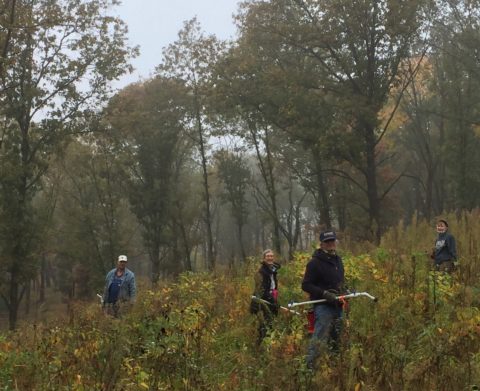Today, on this Earth Day, our camp staff gathered outside to take a little bit of time to talk about land stewardship at Camp Friedenswald. Here is what was shared as acknowledgment, history, and blessing.
Acknowledgment and History:
We acknowledge that we are gathered here on land of the Potawatomi people, past, present, and future, and honor with gratitude the land itself and those who have tended it throughout the generations.
We acknowledge that we, as humans, are dependent on the land for our survival – and that the land is our kin. Land holds our story and a story much bigger than us.
Potawatomi people tended the lands of the St. Joseph River watershed in ways that promoted the health of humans and ecosystems. Their stewardship practices, particularly use of controlled burns, resulted in oak savanna and prairie communities scattered throughout the forests, streams, lakes, and wetlands of this area, providing diverse habitat for the wide variety of plants and animals who could call this place home.
Camp Friedenswald is grateful to the scientists who mapped the natural communities of a pre-colonized Michigan. (See 1800’s vegetation map.) Disappearance of the oak savannas and degradation of many natural communities resulted from settlement of people who did not understand the relationships and ecosystems the Potawatomi and other Indigenous people had been tending for generations. We mourn the loss of these communities, both human and non-human.
We lament continued human impacts on land that results in degradation of ecosystem health and reduced biodiversity across the globe. We know we are part of systems that cause these things to happen. We apologize now to the land for the harm it has endured from human systems and actions.
Over the last 12 years, Camp Friedenswald worked to restore both prairie and oak savanna communities to this land – both of which are critically imperiled ecosystems in Michigan (they are almost extinct). It was only after the bulk of the restoration work was done, that Camp realized it restored ecosystems that existed BECAUSE OF a previous, Indigenous relationship to the land. We are grateful for that post-restoration realization. We are grateful to the ecologists and restoration partners, like the Michigan Department of Natural Resources, who knew the importance of these communities, prioritized funding their restoration, and worked with us to bring them back.

In addition to destruction of prairies and oak savannas, settlers brought with them many plant and animal species that, over the years, have created chaos for the natural communities they entered in the St. Joseph watershed. These invasive plants and animals are living their lives the best way they know – without intent to harm – yet are harming the balance of the ecosystems that have evolved here over thousands of years.
Camp Friedenswald has cared for this land for 75 years. We are grateful for this opportunity. What land care/stewardship looks like at Camp has changed over time, from a completely hands off approach of “Nature Knows Best” to our current hands on approach, acknowledging that humans have influenced the land throughout time. Especially due to the number of invasive plant species entering the natural communities of Camp Friedenswald, measures have been taken to remove those specific species for the overall health of the land.
In 2003, Doug Landis, entomologist at Michigan State University, discovered the Mitchell’s satyr butterfly in the prairie fen at Camp. This discovery catalyzed much of the ecological restoration work at Camp, and maintaining the health of that habitat and butterfly species remains a high priority in our land stewardship efforts. Learning from and partnering with MSU and others on strategies that will help keep the butterfly population healthy have been extremely important to Camp.
Blessing:
Creator in your infinite creativity and wisdom, you created all of life. We thank you for the land that gives and sustains life; for the plants and trees, the water, the creatures, the microbes and the mycelium. Continue to bless this land with your love.
We ask that this year, as we work on maintaining the health of the prairies, oak savanna, prairie fen, and all the ecosystems at Camp Friedenswald, you will grant us wisdom and give us guidance on the best ways to be in relationship with the land and its many creatures.
Grant us understanding – understanding of the complexity present in land stewardship and how to prioritize the best paths forward.
Grant us the wisdom in our decisions on when to remove a plant or animal for the betterment of the community as a whole.
Grant us the passion and energy needed to do this work. As we step out to do this work each day, give us, and those who join us, the energy and excitement to tend to the land.
Grant us humility – help us to remember that we don’t have the complete picture. Help us to remember the land is our kin. Help us remember that the plants and animals we decide to remove are not purposely doing harm and that they do have a purpose, if not in this particular ecosystem.
Grant us patience to pay attention – to listen to the scientific ecological experts, the traditional ecological knowledge of Indigenous people, and the land itself, to help us understand the best paths forward for land stewardship at Camp.
We stand in awe of the regenerative powers and wisdom of nature, of which we are but one part. We ask the land to partner with us to create new life and beauty on this journey together. May the work we do with and on the land result in an abundance of life and diversity that enhances the overall health and well-being of ecosystems here and elsewhere. Amen.